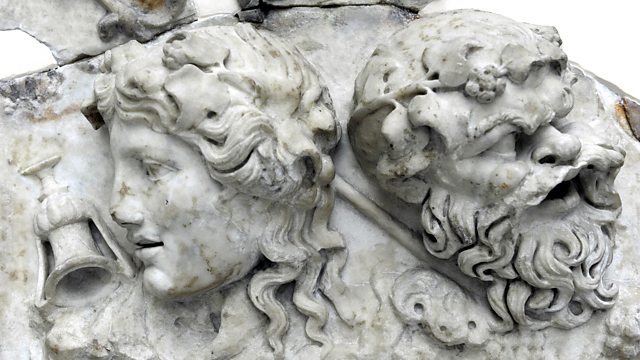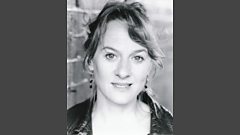
Apollo and Dionysus
A sequence of poetry, prose and music celebrating the gods Apollo and Dionysus and their contrasting natures. With readings by Niamh Cusack and Philip Franks.
This programme is an offering to the gods Apollo and Dionysus, or Bacchus as the Romans called him. Apollo, with his golden curls and athletic beauty is the God of Light. He personifies Reason and Harmony. Dionysus, with vine leaves in his tangled hair, is the God of Wine and he represents Chaos and Ecstasy unchecked by Reason. Are you Apollonian or a Dionysian? If you're not sure, perhaps this edition of Words and Music will help you to make up your mind.
Producer: Philippa Ritchie.
Last on
Music Played
Timings (where shown) are from the start of the programme in hours and minutes
-
![]() 00:00
00:00Ian Venables
Temple to Apollo, from Complete Works for Solo Piano
Performer: Graham Lloyd.- NAXOS 8573156.
- Tr2.
-
Robert Herrick
To Apollo, read by Philip Franks
Callimachus (c. 310-240 BCE) translated by H W Tytler
from Hymn To Apollo, read by Niamh Cusack
![]() 00:03
00:03Benjamin Britten
Young Apollo
Performer: Steven Osborne piano, �鶹Լ�� Scottish Symphony Orchestra.- HYPERION CDA67625.
- Tr6.
Rick Riordan
Percy Jackson and the Titans Curse, read by Philip Franks
![]() 00:07
00:07George Harrison
Here Comes The Sun
Performer: George Harrison (lead vocals) The Beatles.- APPLE 3824682.
- Tr7.
![]() 00:09
00:09Nikolay Tcherepnin
Bacchus Et Les Bacchantes from Le Pavillon dArmide (ballet)
Performer: Moscow Symphony Orchestra, conducted by Henry Shek.- MARCO POLO.
- Tr10.
Bacchae by Robin Robertson, adapted from Euripides
Speech by Dionysus, read by Philip Franks
![]() 00:10
00:10Nikolay Tcherepnin
Bacchus Et Les Bacchantes from Le Pavillon dArmide (ballet)
Performer: Moscow Symphony Orchestra, conducted by Henry Shek.- MARCO POLO.
- Tr10.
![]() 00:13
00:13Jocelyn Pook
Untold Things, Dionysus
Performer: Melanie Pappenheim.- REALWORLD CDRW93.
- Tr1.
Bacchae by Robin Robertson, adapted from Euripides
Speech by the Chorus, read by Niamh Cusack
![]() 00:13
00:13Carl Orff
Veni, Veni, Venias from Carmina Burana
- IMP CLASSICS PCD 855.
- Tr23.
Robert Herrick
A Canticle To Apollo, read by Philip Franks
![]() 00:19
00:19Robert J. Foster
Ancient Empires 1, Anakrousis
Performer: Robert J. Foster.- KPM 0565 01001.
- Tr10.
![]() 00:20
00:20Igor Stravinsky
Apollo, Naissance dApollon
Performer: City of Birmingham Symphony Orchestra conducted by Simon Rattle.- EMI CDC 7 49636 2.
- Tr1.
Rainer Maria Rilke
Archaic Torso of Apollo read by Niamh Cusack
![]() 00:31
00:31Johann Nepomuk Hummel
Variations on Vivat Bacchus
Performer: Madoka Inui.- NAXOS 8572736.
![]() 00:34
00:34Sylvie Bodorová
Juda Maccabeus, Orgies In The Temple
Performer: Prague Radio Symphony amd Prague Royal Philharmonic Choir.- ARCO DIVA UP0065-2.
- Tr9.
![]() 00:34
00:34Henry Purcell
Secular Solo Songs Vol 3, Bacchus Is A Powr Divine
Performer: Michael George, singer and The King's Consort.- HYPERION CDA66730.
- Tr12.
Tony Harrison
Speech of Apollo from The Trackers of Oxyrhynchus, read by Philip Franks
![]() 00:39
00:39Carl Orff
Operas Greatest Drinking Songs, Taberna Quando Sumus from Carmina Burana
Performer: Saint Louis Symphony Orchestra and Chorus, conducted by Leonard Slatkin.- RCA 09026680952.
- Tr7.
Robert Herrick
Apollo, A Short Hymn, read by Niamh Cusack
![]() 00:00
00:00Tomaso Giovanni Albinoni
Nascimento Dell' Aurora, aria: Pianta bella (sung by Apollo)
Performer: Terry Wey and the Clemencic Consort.- OEHMS OC913.
- Tr24.
![]() 00:46
00:46Frédéric Chopin
Prelude in E Minor Op 28 No 4
Performer: Jean‐Yves Thibaudet.- DECCA 466 357-2.
- Tr3.
Matthew Arnold
Apollo Musagates (part of Empedocles on Etna) read by Niamh Cusack
![]() 00:49
00:49Henry Purcell
Dioclesian, aria: Make Room For The Great God Bacchus
Performer: Monteverdi Choir, English Baroque Soloist conducted by John Elliot Gardiner.- ERATO 4509997772.
- Tr16.
![]() 00:53
00:53Alberto Ginastera
Estancia, CD title: Heitor Villar-Lobos, John Antill, Alberto Ginastera
Performer: London Symphony Orchestra, conducted by Sir Eugene Goossens.- Everest evc9007.
- Tr12.
Robert Robinson
extract from Dionysus And The Maiden read by Philip Franks
![]() 00:56
00:56George Frideric Handel
Apolle e Dafne, aria: Cara Pianta CoMiei Pianti
Performer: Thomas Bauer.- CANTATE ITALIANE GLOSSA GCD921527.
- Tr18.
![]() 01:00
01:00Duke Ellington, Jon Hendricks
Gimme That Wine
Performer: Lambert, Hendricks & Ross.- COLUMBIA C2K64933.
- Tr7.
Seamus Heaney
To A Wine Jar, read by Philip Franks
![]() 01:03
01:03Igor Stravinsky
The Rite of Spring, Ritual of Abduction
Performer: City of Birmingham Symphony Orchestra, conducted by Simon Rattle.- EMI CDC 7496362.
- Tr 11.
Robin Robertson, adapted from Euripides
Chorus speech from Bacchae
![]() 01:04
01:04Benjamin Britten
Death in Venice, aria: Receive The Stranger God
Performer: Philip Landridge, City of London Sinfonia, conducted by Richard Hickox.- CHANDOS CHAN102802.
- Tr20.
![]() 01:05
01:05Igor Stravinsky
The Rite of Spring, Ritual of Abduction
Performer: City of Birmingham symphony Orchestra conducted by Simon Rattle.- EMI CDC 7496362.
- Tr 11.
![]() 01:09
01:09Igor Stravinsky
Apollo, Apotheose
Performer: City of Birmingham Symphony Orchestra, Simon Rattle.- EMI CDC 7 49636 2.
- Tr10.
Percy Bysshe Shelley
Hymn of Apollo (final verse) read by Philip Franks
Producer’s Note
Although Apollo and Dionysus are both sons of Zeus, they are completely different.�� Apollo is the God of light and the sun. ��He is the leader of the Muses, so he’s connected with music, poetry and art.�� Dionysus, or Bacchus as the Romans called him, is the God of wine and ecstasy and madness. But he too is associated the arts, with music and theatre in particular.
Scholars have portrayed Apollo as a symbol of harmony and reason and Dionysus as representative of the libido and gratification.�� The dichotomy between the Apollonian and Dionysian was famously analysed by Nietzsche in his essay The Birth of Tragedy.�� A much earlier writer to depict the tension between our rational minds and our primitive urges was Euripides, whose play The Bacchae was first performed in 405 BCE.���� It is a vivid dramatization of what happens when we deny our basic instincts - when Apollonian restraint tries to deny the Dionysian libido.�� It is the tension in all of us between the rational and the irrational, between restraint and release, that I wanted to explore musically and verbally in this programme.��
The first thing I had to consider was whether music could be divided into the Apollonian and the Dionysian and if so, what were the main features of each style? ��I started by looking at Stravinsky and his score for the ballet Apollo (originally entitled Apollo Musagetes) which was choreographed by Balanchine.�� The work was composed in 1927/28, during his neo-Classical period. In his Poetics of Music, Stravinsky said of Apollo “What is important for the lucid ordering of the work – for its crystallization – is that all the Dionysian elements which set the imagination of the artist in motion and make the life-sap rise must be properly subjugated before they intoxicate us, and must finally be made to submit to the law: Apollo demands it."�� He conceived it as a ‘ballet blanc’, a classical ballet in which all the dancers wear white – as in Giselle or the ‘white act’ of Swan Lake.
According to Balanchine, when he heard Stravinsky’s music all he could see was pristine white. The choreography he created for the piece was completely abstract and avoided any hint of story or psychological expression and it was staged in an austere modernist style.�� There is a tranquillity and objectivity to the ballet that is far removed from the dissonant, rhythmic and primitive-sounding score he wrote fourteen years earlier for Nijinsky’s ballet The Rites of Spring.�� That ballet depicts the primitive rituals celebrating spring, ending with the sacrifice of a young woman, ‘the Chosen Maiden’.�� It seemed to me that Stravinsky’s Apollo music is purely Apollonian, whereas The Rite of Spring is purely Dionysian – but you may disagree. ��I decided to start and finish the programme with extracts from Stravinsky’s Apollo, but sandwiched in between are plenty of seductive pieces of Dionysian music, including an extract from The Rites of Spring.��
I wondered whether musical instruments themselves could be divided into the Apollonian or Dionysian.�� The lyre was famously Apollo’s instrument and the aulos was associated with Dionysus. The aulos was a wind instrument, a bit similar to a flute but with a reed mouthpiece. I found it quite difficult to associate the delicacy of a wind instrument with wild Bacchic orgies, though it was easy to associate the plangency of the lyre with Apollo.�� The aulos came from the East, whereas the Greeks invented the lyre, so it may be that the difference between the instruments symbolised the difference between indigenous and Oriental culture.�� To me stringed instruments tend to sound Apollonian, whereas drums and brass feel Bacchic.�� And I also can’t help feeling that melody is essentially Apollo’s territory whereas rhythm belongs to Bacchus. ��The music I have chosen to represent Dionysus in the programme tends to be rhythmic, lower and louder whereas that representing Apollo is sweeter, less dissonant and more measured. ��
Near the end of the programme I have included an extract from Britten’s opera Death in Venice, (based on the Thomas Mann novella) where the central character of von Aschenbach falls asleep and is visited by both Apollo and Dionysus who proceed to give him conflicting advice.�� Dionysus urges von Aschenbach “do not turn away from life . . . do not refuse the mysteries” while Apollo warns him to “reject the abyss . . . be ruled by me and my laws.” Aschenbach cries out “Do what you will with me!” and the scene ends there.�� In the next scene it becomes clear which god has won possession of the hero’s soul.
Most of us contain elements of both gods within our natures and the trick is probably to try and keep a balance between the two.��
��
��
Broadcast
- Sun 25 Jan 2015 17:30�鶹Լ�� Radio 3
The hidden history of plant-based diets
Books website
Get closer to books with in-depth articles, quizzes and our picks from radio & TV.
Gallery



